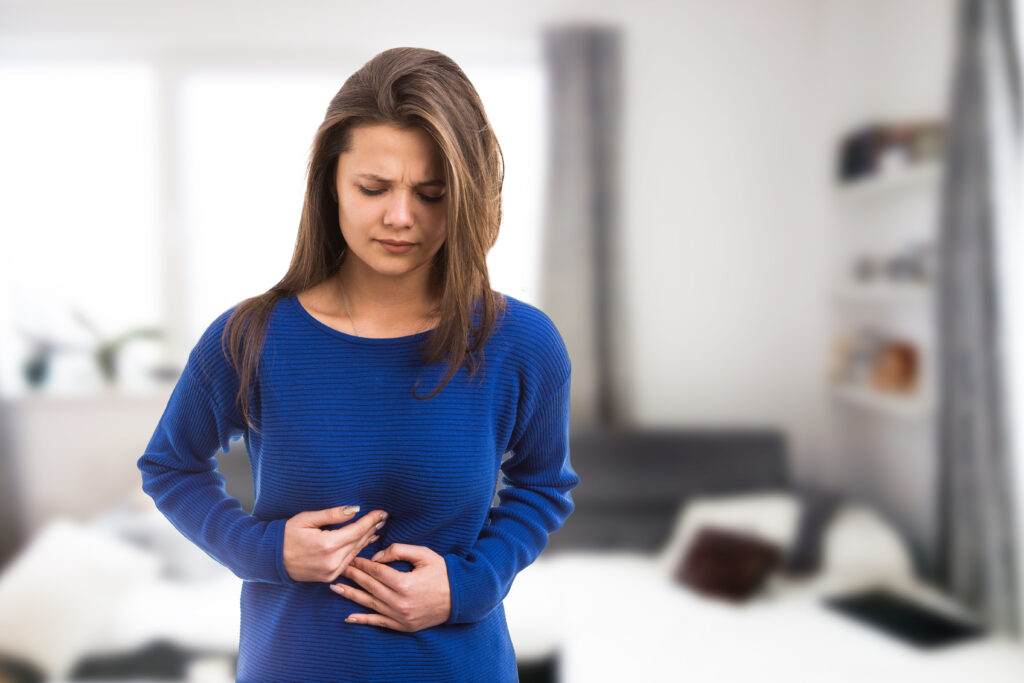Quitting alcohol is one of the best decisions you can make for your health, but it comes with adjustments. While many withdrawal symptoms are widely discussed, one that often catches people off guard is bloating after quitting alcohol.
If you’ve recently stopped drinking and are experiencing bloating, gas, or digestive discomfort, you’re not alone. This is a common but temporary symptom of alcohol withdrawal, caused by changes in digestion, gut bacteria, and hydration levels.
In this guide, we’ll explore:
- Why bloating happens after quitting alcohol
- How long it lasts
- What you can do to relieve symptoms
Understanding these factors can help you navigate recovery from alcohol with confidence and know when it’s time to seek medical advice.
Why Does Bloating Happen After Quitting Alcohol?
Alcohol affects nearly every system in the body, including digestion, hydration, and gut health. When you stop drinking, your body begins to rebalance itself, which can temporarily lead to bloating.
Here are the three main reasons bloating occurs after quitting alcohol:
1. Gut Microbiome Recovery
The gut microbiome refers to the trillions of bacteria that help regulate digestion and overall health. Long-term alcohol use disrupts this balance, leading to:
- An overgrowth of harmful bacteria
- Reduced levels of beneficial gut bacteria
- Increased inflammation in the digestive tract
When you stop drinking, the gut microbiome starts healing. However, as it repopulates and restores balance, you may temporarily experience:
- Increased gas and bloating
- Changes in digestion and bowel movements
- Mild stomach discomfort
2. Inflammation and Digestive System Adjustments
Alcohol is harsh on the digestive system and can cause:
- Gastritis (inflammation of the stomach lining)
- Slowed digestion and disrupted metabolism
- Malabsorption of nutrients
After quitting alcohol, your digestive tract begins repairing itself, but this process can trigger bloating and discomfort in the short term.
3. Water Retention and Hydration Imbalances
Since alcohol is a diuretic, it causes excessive urination and dehydration. When you stop drinking, your body retains water to compensate, leading to temporary bloating and puffiness.
Once your body regulates hydration levels, the bloating should subside.
How Long Does Bloating Last After Quitting Alcohol?
The timeline for bloating after quitting alcohol varies from person to person, depending on factors like how much and how long you drank, overall health, and diet. However, most people follow a general pattern:
- Within the first 0–3 days, bloating can set in as the body begins detoxing. Since alcohol dehydrates the body, your system starts retaining water, which can cause puffiness and digestive discomfort.
- By the end of the first week, your gut bacteria begin to rebalance. While this is a good sign, it can also result in temporary digestive issues, including bloating, gas, and changes in bowel movements.
- Between weeks 2 and 4, bloating typically starts to improve as inflammation in the digestive tract decreases and hydration levels return to normal. During this time, eating nutrient-dense foods, staying hydrated, and engaging in light exercise can help speed up recovery.
- After one month, most bloating should be gone or significantly reduced. However, if bloating persists beyond four weeks, it may be due to an underlying digestive issue, such as irritable bowel syndrome (IBS), food sensitivities, or residual effects of long-term alcohol use. If symptoms continue, it’s best to consult a healthcare professional.
How to Reduce Bloating After Quitting Alcohol
Although bloating is a normal part of alcohol withdrawal, you don’t have to suffer through it. Here are practical steps to reduce bloating and support your recovery:
1. Adjust Your Diet
What you eat can either help or worsen bloating. Making simple dietary changes can support digestion and reduce discomfort.
Eat more of:
- Lean proteins (chicken, fish, turkey) for muscle recovery
- Easily digestible grains (white rice, oatmeal, quinoa)
- Low-fiber vegetables (zucchini, carrots, spinach)
- Probiotic-rich foods (yogurt, kefir, sauerkraut) to restore gut bacteria
- Anti-inflammatory foods (berries, turmeric, ginger) to soothe digestion
Limit or avoid:
- Gas-producing foods (beans, lentils, onions, dairy)
- Carbonated drinks (soda, sparkling water)
- Processed foods high in sugar and sodium
2. Stay Hydrated
Proper hydration is key to reducing bloating and flushing out toxins.
- Drink at least 8–10 glasses of water per day
- Avoid drinking large amounts at once—spread intake throughout the day
- Try herbal teas like peppermint or ginger, which help with digestion
3. Exercise Regularly
Light movement stimulates digestion and reduces water retention.
- Aim for 30 minutes of movement per day, such as walking, yoga, light stretching
- Avoid prolonged sitting—take breaks to move every hour
4. Manage Stress
Stress slows digestion and can worsen bloating. Try these techniques:
- Deep breathing exercises (like box breathing)
- Meditation or mindfulness
- Engaging in hobbies that keep you mentally engaged in recovery
5. Get Enough Sleep
Your body repairs itself during sleep, and poor sleep can slow digestion.
- Aim for 7–9 hours per night
- Avoid screens and caffeine before bed
- Keep a consistent sleep schedule
When to Seek Medical Advice
Bloating is usually a temporary and manageable symptom of alcohol withdrawal. However, see a doctor if:
- Bloating lasts more than a month after quitting alcohol
- You experience severe abdominal pain, nausea, or vomiting
- You have unexplained weight loss or digestive issues
These symptoms could indicate a separate digestive condition that needs medical attention.
Healing Your Body & Mind After Quitting Alcohol
Bloating after quitting alcohol is frustrating, but it’s a sign that your body is healing. Within a few weeks, digestion should improve, gut bacteria will rebalance, and bloating should subside.
If you’re navigating early sobriety and need professional support, Northpoint Colorado is here to help. Our comprehensive alcohol treatment programs offer:
- Medical detox for withdrawal symptoms
- Nutritional counseling to support your body’s recovery
- Therapy & counseling to address emotional triggers
Take the first step toward recovery. Contact us online today and get the support you need to overcome alcohol addiction.
FAQ: Bloating After Quitting Alcohol
1. Why do I feel bloated after quitting alcohol?
Bloating after quitting alcohol happens because your gut microbiome is rebalancing, your digestive system is healing, and your body is adjusting its hydration levels. Alcohol disrupts digestion and causes inflammation, and when you stop drinking, your body needs time to recover.
2. How long does bloating last after quitting alcohol?
Bloating can last anywhere from a few days to a few weeks after quitting alcohol. Most people see improvement within 2–4 weeks as their gut health stabilizes and hydration levels normalize. If bloating persists for more than a month, it may be worth consulting a doctor.
3. Is bloating a sign of alcohol withdrawal?
Yes, bloating can be a symptom of alcohol withdrawal, though it is not as widely discussed as other symptoms like anxiety, insomnia, or cravings. It typically occurs due to digestive system adjustments, water retention, and gut bacteria imbalances.
4. What helps with bloating after quitting alcohol?
To reduce bloating, focus on:
- Eating easily digestible foods like lean proteins, white rice, and non-cruciferous vegetables
- Drinking plenty of water and herbal teas
- Avoiding gas-producing foods like beans, dairy, and carbonated drinks
- Engaging in light exercise like walking or yoga
- Managing stress through breathing exercises or meditation
5. Can quitting alcohol cause stomach pain?
Yes, some people experience temporary stomach pain after quitting alcohol, often due to gastritis, acid reflux, or digestive system changes. If the pain is severe or persistent, consult a healthcare provider to rule out underlying conditions.
6. Will my digestion improve after quitting alcohol?
Yes, quitting alcohol allows your digestive system to heal, which can lead to better nutrient absorption, reduced bloating, and improved gut health over time. It may take a few weeks, but most people notice long-term digestive benefits after quitting drinking.
7. Should I take probiotics to help with bloating?
Probiotics can be helpful for restoring gut bacteria after quitting alcohol. Foods like yogurt, kefir, sauerkraut, and kimchi contain natural probiotics that may improve digestion and reduce bloating. If symptoms persist, a probiotic supplement may also be beneficial.
8. Does quitting alcohol cause weight gain due to bloating?
Bloating after quitting alcohol is not the same as weight gain—it is temporary water retention and digestive changes. Once your body adjusts, bloating typically subsides, and many people lose weight over time due to fewer empty calories from alcohol.
9. When should I see a doctor for bloating after quitting alcohol?
You should see a doctor if:
- Bloating lasts longer than a month
- You have severe abdominal pain, nausea, or vomiting
- You experience unexplained weight loss or other digestive issues
These could be signs of an underlying condition, such as IBS, food intolerances, or liver problems.
10. Can alcohol permanently damage digestion?
Long-term heavy drinking can lead to chronic digestive issues, such as gastritis, acid reflux, and liver disease. However, quitting alcohol allows your digestive system to heal, and many people see significant improvements in gut health within weeks or months.




